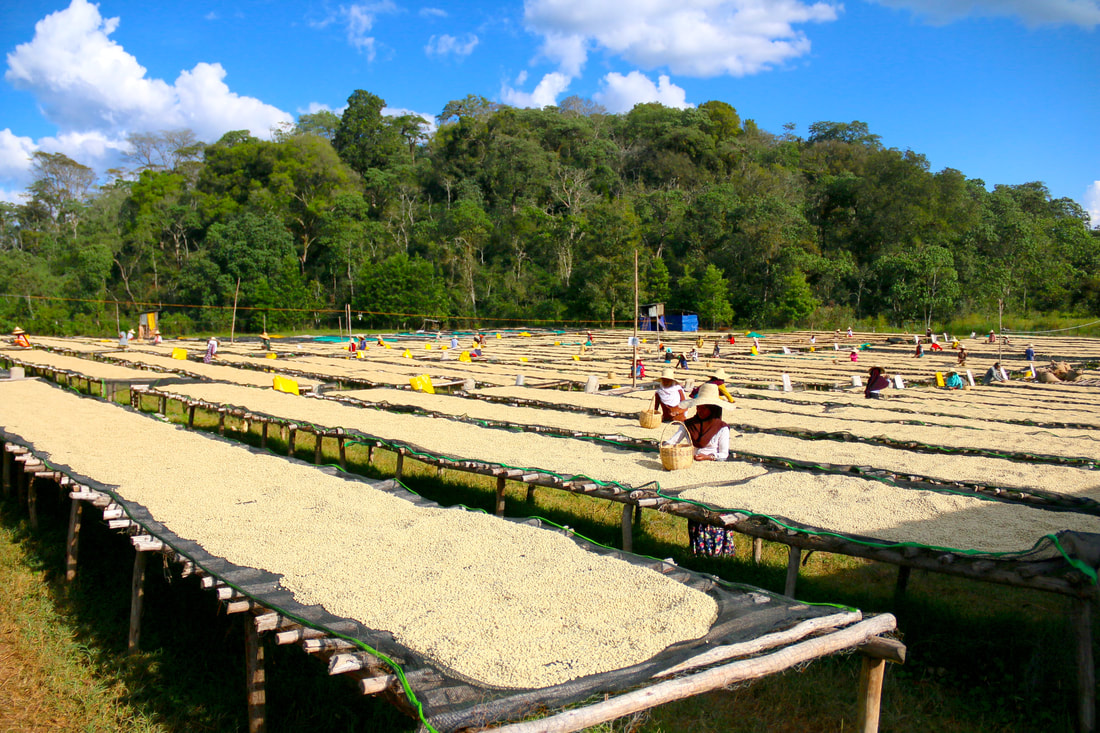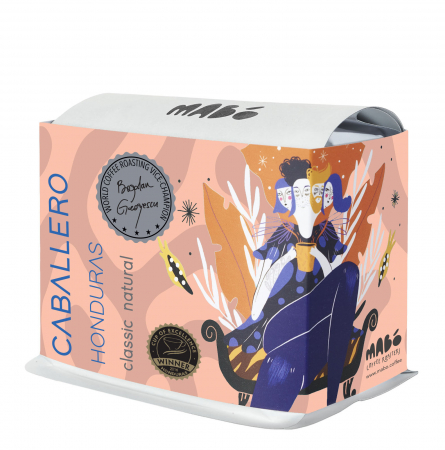Limu, Ethiopia (Washed) Specialty Coffee
| Cupping notes |
| Apricot, Caramel, Nectarine, Green Apple, Chamomile, Medium Body and Acidity, Sweet, Clean |
In the bag, you will find coffee beans.
We can grind the coffee for you! All you need to do is to mention in the Observations Box, before completing your order, how exactly you need it: for espresso, filter, coffeepot, etc.
Roasting profile by Bogdan Georgescu - World Coffee Roasting Vice-Champion and Romanian National Champ. Roasted on Probat P12
Weight:
Product Code:
Limu, Ethiopia 250 g
Do you need help?
+40372901448
La achizitionarea acestui produs primiti
63
fidelity points
- Description
| Origin | Ethiopia |
| Region | Limu, Jimma Zone, Oromia Region |
| Producer | Primrose |
| Fermentation | Washed |
| Arabica Variety | Heirloom |
| Altitude | 1700-1900m |
| Roasting profile | Omni Light (good for espresso | filter) |
| Resting period | Filter 7 days | Espresso 14 days |
Limu is located within the Jimma Zone, of the Oromia Region. In a nearby city in Jimma, you will find a museum, the Jimma University, several markets, and an airport, but you will also find the Jimma Research Centre. Run by the Ethiopian Institute of Agricultural Research, the center specializes in agricultural research that, among other crops, serves to improve the yield of coffee and spices. Across the zone, people particularly love the game of football, or soccer, and team shirts are available for purchase throughout many market stalls.
The average temperature in Jimma ranges between 12 – 28 °C, and the sun graces the sky for anywhere between 4 – 8 hours per day. Unique to the Limu coffee area, the coffees are titled based on the processing methods used. Natural process coffees from this region are called Jimma coffees, while the washed processed coffees are called Limu. We think that is ideal general knowledge for a trivia quiz, but we have yet to show it off.
Coffee trees across all of Ethiopia are mostly grown by small-holder farmers and typically in the farmer’s backyards. This is known as ‘garden coffee’, and when it comes time for harvest, all the garden coffees in the area come together to give us Limu (or Jimma) coffee.
This coffee was sourced through Project Origin and delivered to us courtesy of Artisan Green Bean.


Processing Details
- Cherries are harvested from October – January and taken to the washing station, where small-holder lots are combined.
- Coffee is de-pulped, and floaters are separated before going into large tanks for fermentation.
- De-pulped beans are covered in water and wet-fermented for 12–24 hours to remove mucilage.
- After fermentation, coffee beans are rinsed thoroughly in channels to remove the last bits of mucilage and further separate any floaters.
- Coffee beans are then moved to African beds in the sun to dry for 10–15 days until the moisture level reaches 10–12%.
- On very hot days when coffee beans are on raised beds, they may be covered in plastic to control the rate of drying.
- The local partner, Primrose, does further quality control and sorting during milling. As a minimum, they do a triple-pass through a color sorter and a triple-pass through hand-sorting tables to improve overall quality.
Arabica Variety Heirloom
WHAT IS THE MEANING OF "HEIRLOOM"?
As per the definition provided by the Oxford English Dictionary, the term "heirloom" signifies a valuable item that has been in a family for multiple generations. In the realm of coffee, it is widely used to describe longstanding cultivars of the Coffea Arabica plant from Ethiopia.
In the Ethiopian context, "heirloom" frequently pertains to coffee varieties that are indigenous to the country, many of which still exist in their natural state. Ethiopia boasts an estimated 10,000 to 15,000 heirloom coffee varieties, with the majority yet to undergo formal genetic identification.
These heirloom coffee varieties are generally categorized into two groups: JARC varieties and regional landraces. JARC varieties are those that have been developed and researched by the Jimma Agricultural Research Centre, typically selected for desirable traits like disease resistance or increased yield. On the other hand, regional landraces consist of coffee trees that grow naturally in the wild.
WHAT IS THE MEANING OF "HEIRLOOM"?
As per the definition provided by the Oxford English Dictionary, the term "heirloom" signifies a valuable item that has been in a family for multiple generations. In the realm of coffee, it is widely used to describe longstanding cultivars of the Coffea Arabica plant from Ethiopia.
In the Ethiopian context, "heirloom" frequently pertains to coffee varieties that are indigenous to the country, many of which still exist in their natural state. Ethiopia boasts an estimated 10,000 to 15,000 heirloom coffee varieties, with the majority yet to undergo formal genetic identification.
These heirloom coffee varieties are generally categorized into two groups: JARC varieties and regional landraces. JARC varieties are those that have been developed and researched by the Jimma Agricultural Research Centre, typically selected for desirable traits like disease resistance or increased yield. On the other hand, regional landraces consist of coffee trees that grow naturally in the wild.

Customer Support Roastery Shop (31 Vulturilor) Mon - Fri 08 - 17. Sat 09 - 14. Sun closed | MABÓ ONE (12 Petru Rares): Mon - Fri 08 - 17. Sat - Sun 09 -17
+40372901448 wholesales: sales@mabo.coffee; other questions: orders@mabo.coffee![Limu Ethiopia by MABO [Bogdan Georgescu] [1] Limu Ethiopia by MABO [Bogdan Georgescu] [1]](https://gomagcdn.ro/domains/mabo.coffee/files/product/large/limu-etiopia-washed-cafea-de-specialitate-268213.jpg)
![Limu Ethiopia by MABO [Bogdan Georgescu] [2] Limu Ethiopia by MABO [Bogdan Georgescu] [2]](https://gomagcdn.ro/domains/mabo.coffee/files/product/large/el-limoncillo-nicaragua-anaerobic-low-temperature-cafea-de-specialitate-165-703221449618858860695895.jpeg)
![Limu Ethiopia by MABO [Bogdan Georgescu] [3] Limu Ethiopia by MABO [Bogdan Georgescu] [3]](https://gomagcdn.ro/domains/mabo.coffee/files/product/large/el-limoncillo-nicaragua-anaerobic-low-temperature-cafea-de-specialitate-165-831350402100717812482537.jpeg)
![Limu Ethiopia by MABO [Bogdan Georgescu] [4] Limu Ethiopia by MABO [Bogdan Georgescu] [4]](https://gomagcdn.ro/domains/mabo.coffee/files/product/large/haile-gebrselassie-ethiopia-washed-cafea-de-specialitate-012380542291496525.jpg)
![Limu Ethiopia by MABO [Bogdan Georgescu] [5] Limu Ethiopia by MABO [Bogdan Georgescu] [5]](https://gomagcdn.ro/domains/mabo.coffee/files/product/large/haile-gebrselassie-ethiopia-washed-cafea-de-specialitate-177542627619509950.jpg)
![Limu Ethiopia by MABO [Bogdan Georgescu] [0] Limu Ethiopia by MABO [Bogdan Georgescu] [0]](https://gomagcdn.ro/domains/mabo.coffee/files/product/medium/limu-etiopia-washed-cafea-de-specialitate-268213.jpg)
![Limu Ethiopia by MABO [Bogdan Georgescu] [1] Limu Ethiopia by MABO [Bogdan Georgescu] [1]](https://gomagcdn.ro/domains/mabo.coffee/files/product/medium/el-limoncillo-nicaragua-anaerobic-low-temperature-cafea-de-specialitate-165-703221449618858860695895.jpeg)
![Limu Ethiopia by MABO [Bogdan Georgescu] [2] Limu Ethiopia by MABO [Bogdan Georgescu] [2]](https://gomagcdn.ro/domains/mabo.coffee/files/product/medium/el-limoncillo-nicaragua-anaerobic-low-temperature-cafea-de-specialitate-165-831350402100717812482537.jpeg)
![Limu Ethiopia by MABO [Bogdan Georgescu] [3] Limu Ethiopia by MABO [Bogdan Georgescu] [3]](https://gomagcdn.ro/domains/mabo.coffee/files/product/medium/haile-gebrselassie-ethiopia-washed-cafea-de-specialitate-012380542291496525.jpg)
![Limu Ethiopia by MABO [Bogdan Georgescu] [4] Limu Ethiopia by MABO [Bogdan Georgescu] [4]](https://gomagcdn.ro/domains/mabo.coffee/files/product/medium/haile-gebrselassie-ethiopia-washed-cafea-de-specialitate-177542627619509950.jpg)

![Los Placeres, Nicaragua by MABO [Bogdan Georgescu] Los Placeres, Nicaragua by MABO [Bogdan Georgescu]](https://gomagcdn.ro/domains/mabo.coffee/files/product/medium/los-placeres-nicaragua-washed-cafea-de-specialitate-755905.jpg)
![Gimbo Ethiopia by MABO [Bogdan Georgescu] Gimbo Ethiopia by MABO [Bogdan Georgescu]](https://gomagcdn.ro/domains/mabo.coffee/files/product/medium/gimbo-etiopia-natural-cafea-de-specialitate-661109.jpg)
![Garse Ethiopia by MABO [Bogdan Georgescu] Garse Ethiopia by MABO [Bogdan Georgescu]](https://gomagcdn.ro/domains/mabo.coffee/files/product/medium/garse-ethiopia-natural-anaerobic-cafea-de-specialitate-801426.jpg)

![Nazimu Abamecha Ethiopia by MABO [Bogdan Georgescu] Nazimu Abamecha Ethiopia by MABO [Bogdan Georgescu]](https://gomagcdn.ro/domains/mabo.coffee/files/product/medium/nazimu-abamecha-etiopia-honey-cafea-de-specialitate-028805.jpg)
![Capsules - Nazimu Abamecha, Ethiopia [Honey] - Specialty Coffee Capsules - Nazimu Abamecha, Ethiopia [Honey] - Specialty Coffee](https://gomagcdn.ro/domains/mabo.coffee/files/product/medium/capsule-nazimu-abamecha-etiopia-honey-cafea-de-specialitate-808158.jpg)